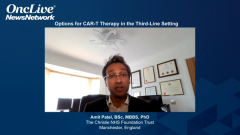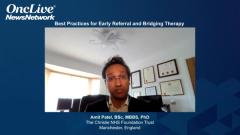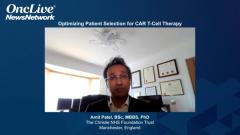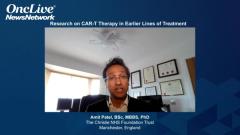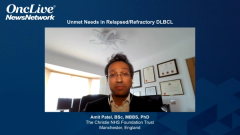
Unmet Needs in Relapsed/Refractory DLBCL
An expert in hematology oncology, Amit Patel, BSc, MBBS, PhD, reviews the unmet needs for patients with relapsed/refractory diffuse large B-cell lymphoma.
Amit Patel, BSc, MBBS, PhD: My name is Amit Patel. I’m a consultant in cellular therapies and stem cell transplantation. I work at The Christie NHS Foundation Trust in Manchester [in England], and I lead the cellular and CAR [chimeric antigen receptor] T-cell program.
There is an ongoing patient need for patients with relapsed/refractory diffuse large B-cell lymphoma. Patients in this category either will have primary refractory disease to frontline therapy, typically on CHOP [cyclophosphamide, hydroxydaunorubicin hydrochloride, vincristine, prednisone]. A percentage of patients will have advanced-stage disease, or they will have had a response to R-CHOP [rituximab, cyclophosphamide, hydroxydaunorubicin hydrochloride, vincristine, prednisone] or other frontline therapies and then relapsed. This is the relapsed/refractory patient population we’re talking about. They will go on to receive second-line therapy, and if they’re transplant eligible, then they will go on to have a platinum-based salvage regimen. If they’re not, then they will go on to have other potential regimens.
The patients who either don’t respond to salvage therapy, or who relapse after salvage therapy and a transplant, will then be eligible for CAR T therapy. CAR T therapy is available in the third-line space for relapsed/refractory diffuse large B-cell lymphoma. Before we had CAR T therapy, these patients would unfortunately have had a limited survival potential with very few patients surviving more than a few months and small numbers surviving out to a year. CAR T therapy has been able to rescue patients who would have otherwise died and achieve a progression-free survival between 30% and 40% with an overall survival of 40% to 50%, with long-term data out to around 4 years.
Transcript Edited for Clarity


